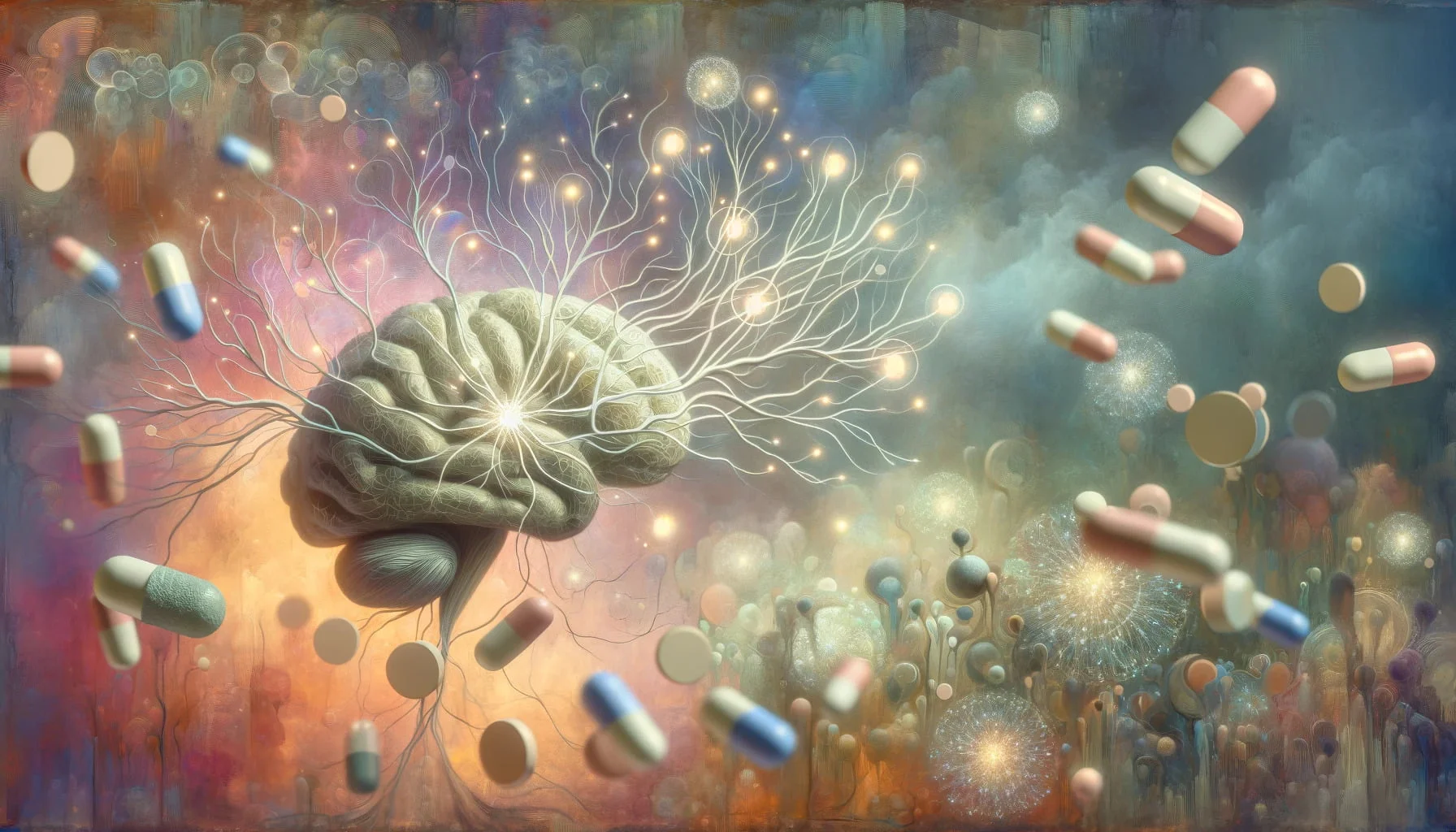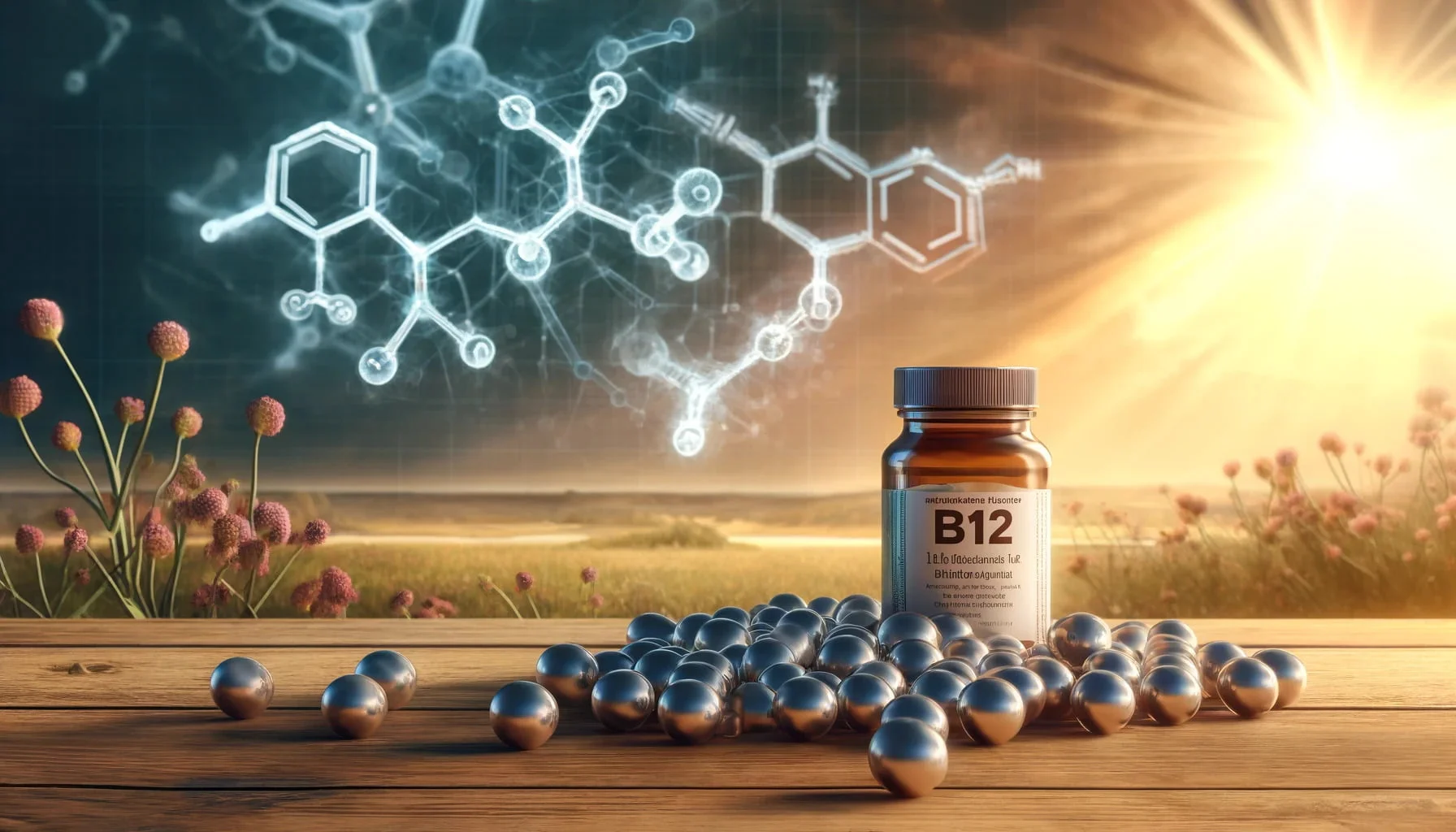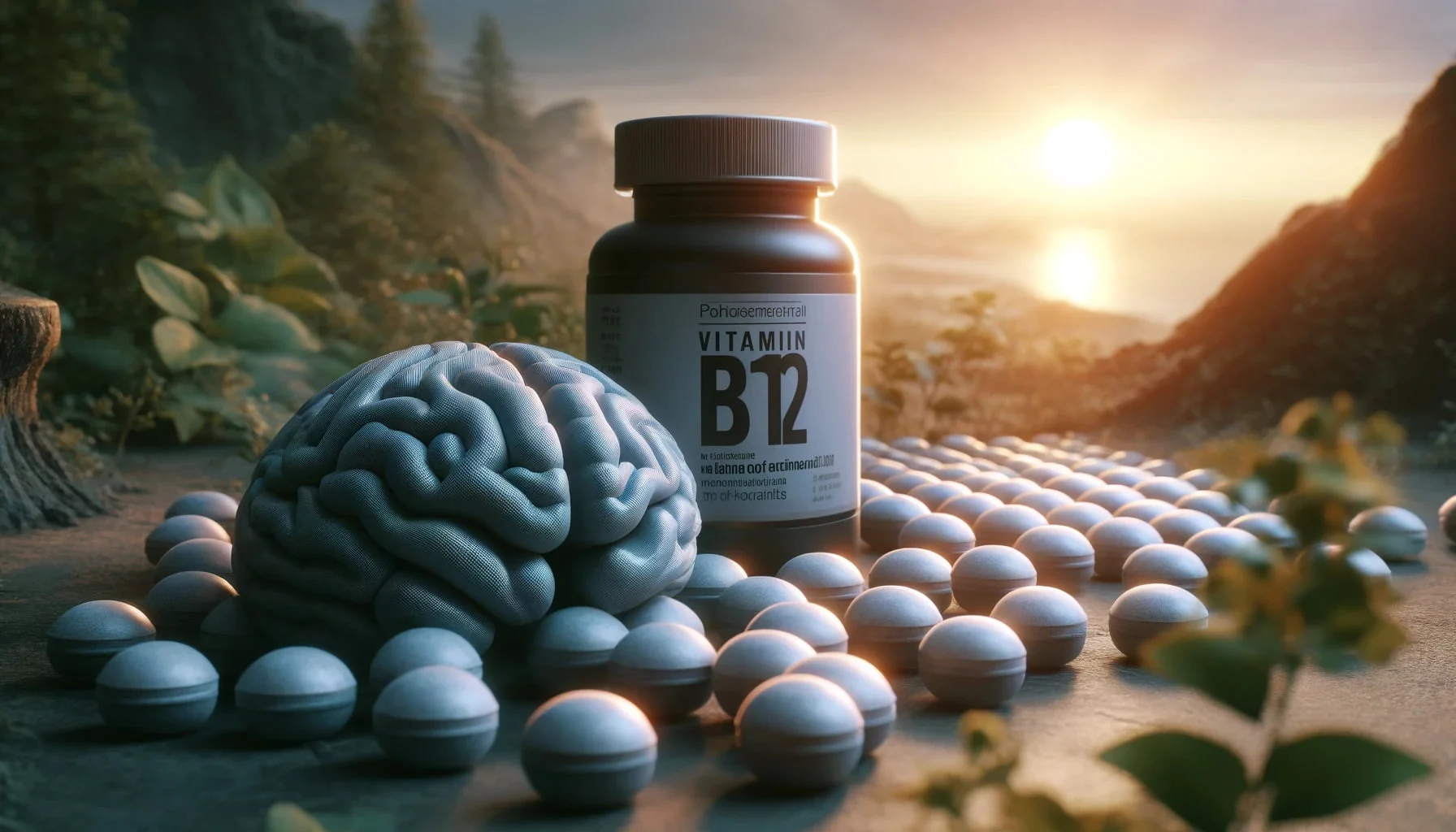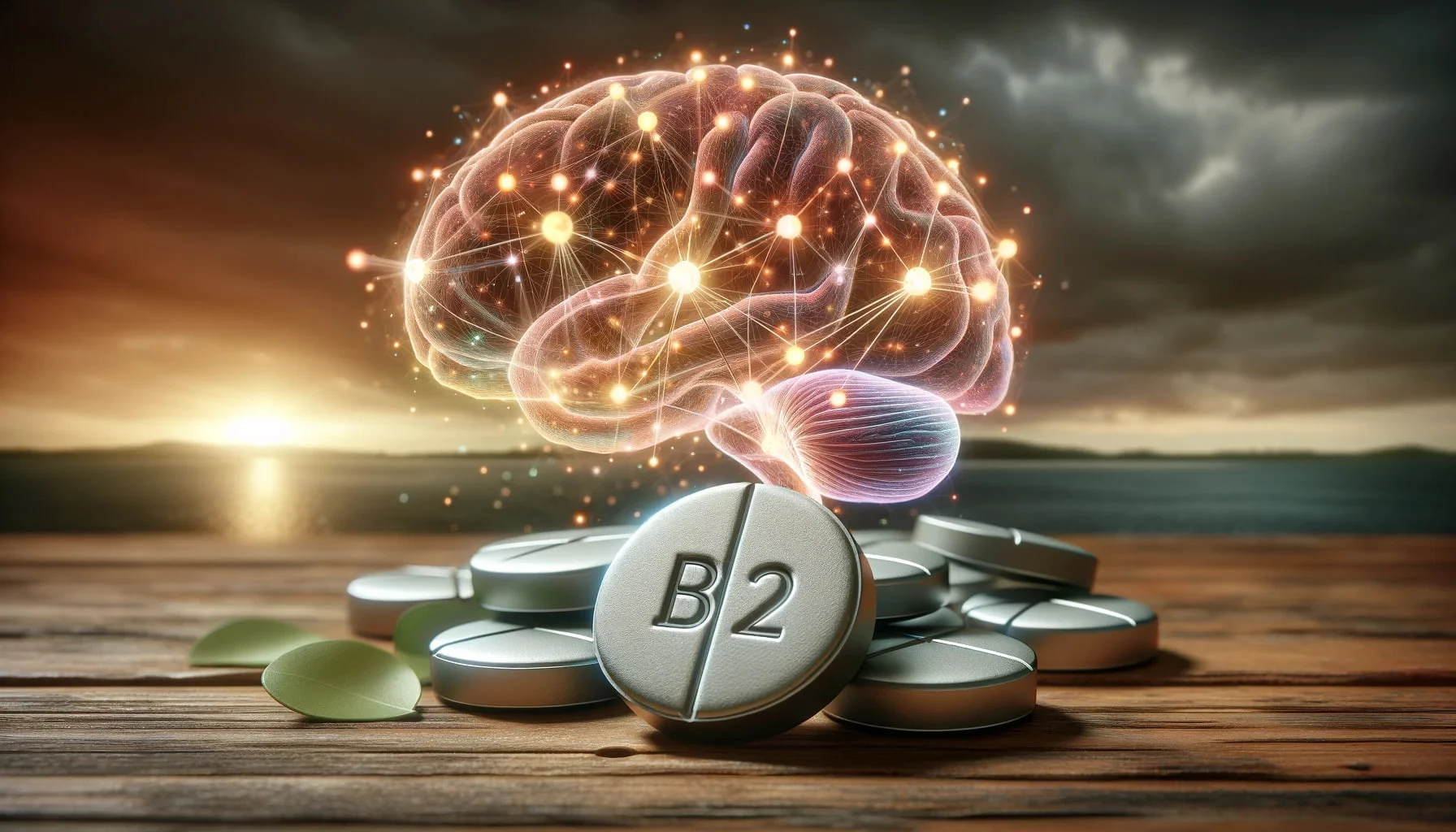
Vitamin B12, or cobalamin, is a vital nutrient renowned for its powerful nootropic properties.
Essential for nerve function, DNA synthesis, and red blood cell formation, vitamin B12 has gained recognition for its ability to enhance memory, boost energy levels, and support overall cognitive health.
Discover how this essential vitamin can elevate your mental capabilities and support your overall well-being!
Table of Contents
What is Vitamin B12?
Vitamin B12 (cobalamin) is a water-soluble vitamin that belongs to the B-complex family of vitamins. It’s an essential nutrient, meaning the body cannot produce it independently and must obtain it through dietary sources or supplementation.

Vitamin B12 plays a vital role in various physiological processes, including red blood cell formation, DNA synthesis, and proper nervous system function.
The body stores several years’ worth of B12, so deficiency is rare but can still occur, especially in those following strict vegan or vegetarian diets.
The two active forms of B12 in humans are:
- Methylcobalamin
- Adenosylcobalamin
What Are The Different Forms of Vitamin B12?
Vitamin B12 exists in several forms, including:
- Cyanocobalamin: The most common and stable synthetic form of B12, it is used in supplements and fortified foods.
- Methylcobalamin: The active form of B12 that participates in homocysteine metabolism and methionine synthesis.
- Adenosylcobalamin: Another active form of B12 involved in cellular energy production.
- Hydroxocobalamin: A form of B12 often used in intramuscular injections to treat deficiency.
What Are The Functions of Vitamin B12 in The Brain and Body?
Vitamin B12 serves several essential functions in the brain and body:
- Red blood cell formation: B12 is necessary for the production of healthy red blood cells, which transport oxygen throughout the body.
- DNA synthesis: It plays a role in the synthesis and regulation of DNA, the genetic material in all cells.
- Neurological function: B12 is crucial for maintaining the health of nerve cells and supporting the production of myelin, the protective sheath around nerves.
- Homocysteine metabolism: B12 helps convert homocysteine, an amino acid, into methionine, reducing the risk of cardiovascular disease and cognitive decline.
What Are The Dietary Sources of Vitamin B12?
Vitamin B12 is primarily found in animal-derived foods, such as:
- Meat (beef, pork, lamb)
- Poultry (chicken, turkey)
- Fish (salmon, tuna, cod)
- Eggs
- Dairy products (milk, cheese, yogurt)
Some plant-based sources of B12 include fortified cereals, nutritional yeast, and certain algae.
Note: These sources may not provide adequate amounts of bioavailable B12.
What is Vitamin B12’s Mechanism of Action?
Vitamin B12 acts as a cofactor for several enzymes involved in critical biochemical reactions:
| Action | Mechanism |
|---|---|
| Methionine synthase | B12 is required for the conversion of homocysteine to methionine, an essential amino acid involved in protein synthesis and neurotransmitter production. |
| Methylmalonyl-CoA mutase | B12 helps convert methylmalonyl-CoA to succinyl-CoA, a compound involved in energy production and the synthesis of hemoglobin. |
By supporting these enzymatic reactions, vitamin B12 contributes to proper nervous system function, red blood cell formation, and overall cellular health.
How is Vitamin B12 Metabolized in The Body?
The absorption and metabolism of vitamin B12 involve several steps:
- Protein-bound B12 is released in the stomach by the action of hydrochloric acid and pepsin.
- Free B12 binds to a protein called intrinsic factor, secreted by the stomach’s parietal cells.
- The B12-intrinsic factor complex is absorbed in the small intestine, specifically in the ileum.
- Once absorbed, B12 is transported to the liver for storage or released into the bloodstream for use by other tissues.
How Bioavailible is Vitamin B12?
The bioavailability of vitamin B12 varies depending on the source and individual factors:
| Form | Bioavailability |
|---|---|
| Animal-derived sources | (+-) 50-60% |
| Plant-based sources | (+-) 30-50% |
Note: Older adults and individuals with certain gastrointestinal disorders may have reduced B12 absorption due to decreased intrinsic factor production or impaired gut health.
What Are The Cognitive Benefits of Vitamin B12?

Vitamin B12 has been associated with several cognitive benefits:
- Memory enhancement
- Reduced brain fog
- Slowed cognitive decline
- Improved mood
How Does B12 Boost Memory Recall and Learning Abilities?
Vitamin B12 boosts memory recall and learning abilities by supporting the health of neurons and neurotransmitter signaling.
According to a clinical study from 2016, higher B12 levels are associated with better memory performance and slower cognitive decline in older adults.(1)
B12 is essential for the synthesis of myelin, the protective sheath around nerve fibers that facilitates quick and efficient transmission of nerve impulses. Optimal B12 levels ensure proper myelination, enhancing memory formation and recall.
B12 also plays a key role in the metabolism of homocysteine, an amino acid that can be neurotoxic at high levels.
Elevated homocysteine is linked to impaired cognitive function and Alzheimer’s disease. By regulating homocysteine, B12 helps protect the brain from potential damage and supports learning abilities.
How Does B12 Reduce Brain Fog?
Vitamin B12 reduces brain fog by supporting energy production in the brain and preventing neuroinflammation. Brain fog is characterized by mental fatigue, confusion, and difficulty concentrating.
Adequate B12 ensures the brain has sufficient energy to function optimally, reducing fatigue and brain fog.
Additionally, B12 has anti-inflammatory and antioxidant properties that protect the brain from oxidative stress and inflammation, which can contribute to brain fog.
A clinical study found that B12 supplementation improved symptoms of brain fog, mental fatigue, and mood in patients with chronic fatigue syndrome.(2)
How Does Vitamin B12 Slow Cognitive Decline?
Vitamin B12 slows cognitive decline by maintaining the integrity of brain structures and reducing the risk of age-related neurodegeneration.
A study found that higher B12 levels were associated with lower rates of brain volume loss over 5 years in older adults.(3)
Preserving brain volume is crucial for maintaining cognitive function as we age.
B12 also reduces the accumulation of homocysteine, which can be neurotoxic and contribute to the development of Alzheimer’s disease and other forms of dementia.(4)
Furthermore, B12 supports the synthesis of neurotransmitters like serotonin and dopamine, which regulate mood, cognition, and behavior.
Maintaining proper neurotransmitter balance is essential for optimal brain function and slowing cognitive decline in older adults.
How Does Vitamin B12 Improve Mood?
Vitamin B12 improves mood by regulating the synthesis and function of neurotransmitters involved in emotional well-being, such as serotonin and dopamine.
Serotonin is known as the “happiness hormone” because of its role in promoting positive mood, relaxation, and contentment.
B12 is a cofactor in the synthesis of serotonin from the amino acid tryptophan.
Adequate B12 levels ensure sufficient serotonin production, which can provide relief from symptoms of depression and anxiety.(5)
A study found that elderly individuals with B12 deficiency and elevated homocysteine were more likely to experience depression. Correcting B12 deficiency and lowering homocysteine can help restore proper neurotransmitter balance and improve mood.(6)
What Are The Side Effects and Risks Associated with Vitamin B12 Supplementation?
Vitamin B12 supplementation is generally considered safe, with few side effects reported.

However, some potential risks include:
- Allergic reactions: Rarely, individuals may experience an allergic reaction to B12 supplements, particularly if they are sensitive to cobalt.
- Acne: High doses of B12 have been linked to the development of acne in some individuals.
Who Should Avoid Using Vitamin B12 as A Nootropic?
While vitamin B12 is safe, some individuals should exercise caution or avoid using it as a nootropic:
- Those with a history of allergic reactions to cobalt or B12 supplements.
- For people with certain genetic disorders, such as Leber’s hereditary optic neuropathy (LHON), B12 supplementation may worsen their condition.
Are There Any Known Medical Interactions With Vitamin B12?
Yes, vitamin B12 can interact with several medications:
- Proton pump inhibitors (PPIs): Long-term use of PPIs can reduce B12 absorption by decreasing stomach acid production.
- Metformin: This diabetes medication can decrease B12 absorption in the gut, potentially leading to deficiency.
- Chloramphenicol: This antibiotic may interfere with the body’s ability to use B12.
How To Use Vitamin B12 as A Nootropic?
To use vitamin B12 as a nootropic, consider the following:
- Assess your B12 status
- Choose the right form of B12 for your status
- Start with a low-dose
- Combine with other nootropics
What is The Recommended Dosage of Vitamin B12?
The recommended daily allowance (RDA) for vitamin B12 varies by age and life stage:
| Person | Form |
|---|---|
| Adults | 2.4 mcg per day |
| Nootropic purposes | 500 – 1000 mcg |
| Lactating women | 2.8 mcg per day |
Remember, it’s essential to consult with a healthcare professional before starting any new supplement regimen.
How to Use Vitamin B12 in A Nootropic Stack?
B12 can be used in a nootropic stack to potentially enhance cognitive performance. Some common nootropics that may work well with B12 include:
- Omega-3 fatty acids: These essential fats support brain health and may improve memory and cognitive function.
- Acetyl-L-carnitine: This amino acid derivative helps transport fatty acids into mitochondria for energy production and has been shown to improve memory and cognitive function in older adults.
- Citicoline: This compound supports brain cell membranes and neurotransmitter production, and has been found to improve attention and memory.
- Köbe, Theresa et al. “Vitamin B-12 concentration, memory performance, and hippocampal structure in patients with mild cognitive impairment.” The American journal of clinical nutrition vol. 103,4 (2016): 1045-54. doi:10.3945/ajcn.115.116970↩
- Markun, Stefan et al. “Effects of Vitamin B12 Supplementation on Cognitive Function, Depressive Symptoms, and Fatigue: A Systematic Review, Meta-Analysis, and Meta-Regression.” Nutrients vol. 13,3 923. 12 Mar. 2021, doi:10.3390/nu13030923↩
- Tangney, C C et al. “Vitamin B12, cognition, and brain MRI measures: a cross-sectional examination.” Neurology vol. 77,13 (2011): 1276-82. doi:10.1212/WNL.0b013e3182315a33↩
- Lauer, Anna Andrea et al. “Mechanistic Link between Vitamin B12 and Alzheimer’s Disease.” Biomolecules vol. 12,1 129. 14 Jan. 2022, doi:10.3390/biom12010129↩
- Sangle, Prerna et al. “Vitamin B12 Supplementation: Preventing Onset and Improving Prognosis of Depression.” Cureus vol. 12,10 e11169. 26 Oct. 2020, doi:10.7759/cureus.11169↩
- Elstgeest, L E M et al. “Vitamin B12, homocysteine and depressive symptoms: a longitudinal study among older adults.” European journal of clinical nutrition vol. 71,4 (2017): 468-475. doi:10.1038/ejcn.2016.224↩
